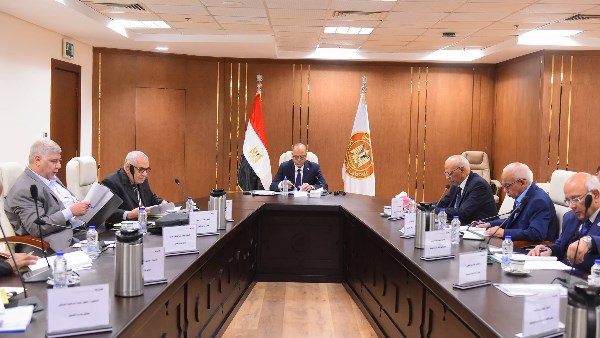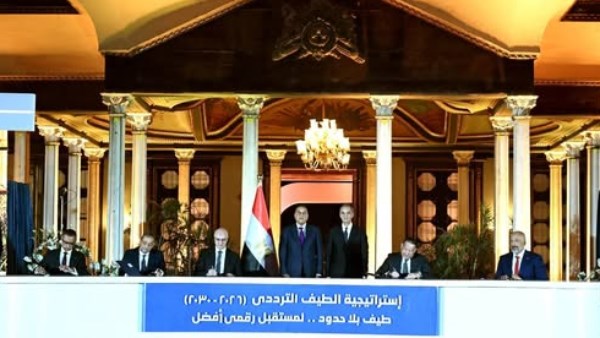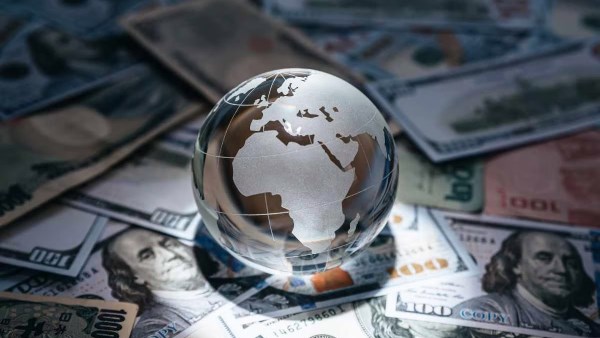
The pound plunged and crossed 50 per dollar at 1.30 p.m.
Egypt Unexpectedly Hikes Interest Rates as Devaluation Looms

Egypt hiked interest rates and allowed its currency to weaken more than 35% in a long-awaited devaluation that may pave the way for billions more in loans from the International Monetary Fund.
The government will hope it’s enough to ease a dire shortage of foreign exchange that’s hammered businesses and caused the cost of imported goods to soar.
Adding to inflationary pressures
The devaluation may add to inflationary pressure and hurt Egyptians in the short term. But President Abdel-Fattah El-Sisi and his officials are banking on the reforms attracting foreign investors back to the country of 105 million people — whose stability is seen as crucial for the wider Middle East — and ending its worst economic crisis in decades.
Egyptian media reported that a new deal with the IMF could be signed later on Wednesday. A team from the Washington-based lender is in Cairo this week. The new pact will likely increase Egypt’s current IMF loan of $3 billion — little of which has been disbursed — to more than $10 billion، an amount that will include funds from other partners.
The pound plunged and crossed 50 per dollar at 1.30 p.m. local time، having traded at about 30.9 for the past year. It started dropping minutes after the central bank raised its key rate by 600 basis points to 27.25% at an unscheduled meeting and said it will allow the market to determine the exchange rate.
A deal with UAE
The devaluation came after Cairo struck a $35 billion deal late last month with the United Arab Emirates to develop parts of Egypt’s Mediterranean coast and elsewhere. Authorities described it as the biggest foreign investment ever secured by Egypt and the scale took investors by surprise.
“We’ll have to wait to see where it settles،” said Farouk Soussa، an economist at Goldman Sachs Group Inc.، referring to the currency. “We expect 45-50. The big surprise of the day was the mega hike، which overdelivered and has boosted confidence in the market.”
The devaluation brought the pound to a level around its value on the black market. The IMF has long encouraged Egypt to tighten monetary policy to counter inflation of almost 30% and adopt a more flexible official exchange rate.
The central bank’s Monetary Policy Committee said it had “decided to accelerate the monetary tightening process in order to fast-track the disinflation path.”
“The combination of massive inflows from Abu Dhabi، a 600 basis-point rate hike، an IMF deal that now looks imminent، and the devaluation has got the market very excited،” said Carmen Altenkirch، an analyst at Aviva Investors Global Services Ltd.
Egypt’s dollar bonds rallied significantly. Government debt due in 2047 led the advance، gaining 4 cents on the dollar to around 82 cents. That led the yield to fall to around 10.6% from 11% earlier in the week.
Stocks also rose. The benchmark EGX30 stock index increased more than 5% to a record، led by gains in Commercial International Bank. Lenders stand to benefit from higher interest rates.
Ziad Daoud، chief emerging-markets economist، said: “The arrival of the UAE bailout has unlocked the policy chain reaction in Egypt. The central bank has lifted interest rates. Authorities have floated the currency، and the gap with the black market should close. What’s next? A deal with the IMF is likely in the next few hours.”
Weak domestic currency
Exporters like Abou Kir Fertilizers & Chemical Industries Co.، which benefit from a weak domestic currency، were also among the stocks rising heavily.
The Muslim holy month of Ramadan، set to begin on Sunday، posed an informal deadline for authorities for a devaluation. It’s a period of big family gatherings and expansive evening meals، and authorities were unlikely to wait until then to hand Egyptians a sudden price shock.
The IMF has delayed two reviews of Egypt’s existing loan after the country appeared to fall short on promises to allow for a flexible exchange rate. Previous bouts of depreciation — in March 2022، October 2022 and January 2023 — were followed by long stretches of stability.
The IMF is keen to protect the $400 billion economy that’s been in crisis for much of the past two years. Russia’s invasion of Ukraine hit hard، leading to higher prices for imports of wheat and fuel and causing bond investors to flee the country.
More recently، it’s suffered from the Israel-Hamas war in Gaza، which borders Egypt. That caused a slump in tourism late last year. In addition، shipping attacks by Houthi militants in the Red Sea have seen traffic through the Suez Canal — a critical source of income for Egypt، amounting to billions of dollars a year — dive.
“It might take a few days or weeks for the exchange rate to stabilize around its new equilibrium،” said Gergely Urmossy، an emerging markets strategist at Societe Generale SA. If the central bank “transitions away from the hard peg، Egypt’s outlook will improve.”





-1120252475029447.jpg)















